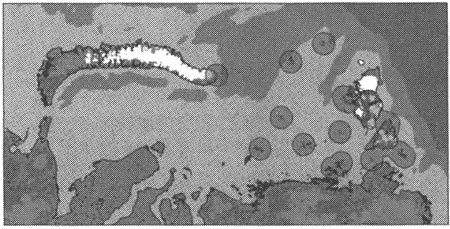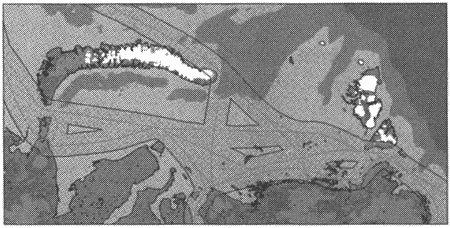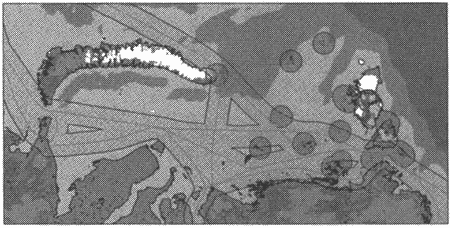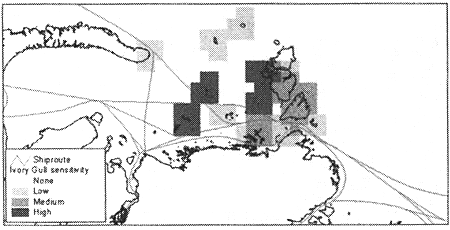The following abbreviations are used: Valued Ecosystem Component - VEC; Dynamic Environmental Atlas - DEA; Impact Factor - IF.
a) In the beginning was the natural environment ... In a selected area of the NSR, some VECs are common at certain periods of the year. The relevant type of data (in this example on lvory gull) is stored in the DEA data-base and standard routines are developed for compilation of key information on maps and tables.

b) Ships of the NSR fleet navigate the selected waters regularly. The spatial navigation pattern is applied to the environment in terms of historical sailing routes. The navigation however represents a certain level of physical disturbance and noise, two types of IFS to the VEC. The spatial range of the IF, in terms of the area that may be influenced by noise, are calculated and applied to the routes by tailored buffer-routines,

c) By joining the area affected and the lvory gull distribution, the intersections between the IF and VEC abundance can be identified and the fraction of the populations affected can be calculated.

d) On the basis of the VEC distribution (3-16a), the range of the IF (3-16b) and the vulnerability to the IF, algorithms are developed to aggregate this information on a grid level, i.e. counting the fractions affected within each cell. The aggregated results are the non-dimensional PIL indices (none, low, medium, high) , indicating the potential impact level.

Figure 4.5-6 Outline of the step-based approach to impact assessment
Moreover, if the NSR, which has for so long been closed to passage by foreign vessels, should experience a sudden and dramatic rise in traffic, the pollution of the NSR by ships would become a grave threat to the NSR environment. It has also been pointed out that the open water channels created by navigation would have a biological impact, and the noise emitted in both air and water by navigating ships is known to affect the breeding seasons of many organisms. At the very least, control must be adopted to minimize the impact of these disturbances on the fragile Arctic ecosystem.
Marine pollution originating in the operation of ships is unique for two reasons. First, the area affected by this pollution is extremely wide. Second, its impact and the measures needed to tackle it are distinctly international in character. For these reasons, provisions of international law, such as conventions of the United Nations and other international agencies and regional agreements among affected countries, have long been in place to govern these issues.
BACK CONTENTS NEXT